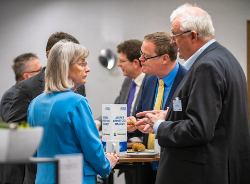 Day one of the ERA Regional Airline Conference 2019 opened in Prague today, 27 March. This annual event increases in popularity every year and more than 260 delegates attended the 2019 conference.
Day one of the ERA Regional Airline Conference 2019 opened in Prague today, 27 March. This annual event increases in popularity every year and more than 260 delegates attended the 2019 conference.
The Airline and Airport CEOs’ Breakfast and Meeting kick-started the day, which included informative presentations from representatives from JLT Speciality , Baines Simmons and Wings Alliance.
This was followed by a networking lunch for all of our attendees and then an opening speech from ERA President Andrew Kelly. Kelly referenced the current subjects dominating the news at the moment, including Brexit – a topic to be discussed in tomorrow morning’s conference session – and the recent grounding of Boeing 737 MAX 8 and 9. He said: “These are strange and difficult times for the industry in terms of media alarmism and as a group, we must redouble our efforts to show that safety is our first priority and a way of life.”
 The future of aviation
The future of aviation
As we approach the 2020s and move into a new decade for air transport, the first session asked "what does the current European landscape look like in terms of connectivity, growth and competitiveness for our industry?" Chaired by AAR Corp.’s VP Corporate Marketing, Pascal Parant, today’s first conference session included experts from across the industry discussing the currenr issues faced, the importance of connectivity and the future of the market. Speakers included:
- Brian Pearce, Chief Economist, IATA – The issues driving European airline financial performance;
- Flor Diaz Pulido, Head of Unit Aviation Policy, Directorate General for Mobility and Transport, European Commission – The importance of the regional market, connectivity and competition in Europe; and
- Henk Ombelet, Head of Advisory Operations, Ascend by Cirium – Future aviation market trends in Europe.
Pearce, Diaz Pulido and Ombelet all highlight the many challenges facing the European and regional airline market at the moment.
Pearce said: “We face an environment where costs are high, we’re short of infrastructure and we have European regulatory costs, meaning the European aviation industry has to work all the harder just to break even - these are things that need to be examined.”
Diaz Pulido highlighted the seven main challenges and areas of focus she sees: safety, security, sustainability, competitiveness, connectivity, citizens and capacity. She continued to describe these in detail and the EC’s plans to evaluate them in more detail over the course of the year with the help of the industry.
Finally, Ombelet spoke of geopolitical and economic threats as well as growth cycles, from Brexit to the environment, providing the company’s analysis and statistics throughout.
The great manufacturers’ debate!
The leaders of ERA’s aircraft manufacturer members took to the stage in this session to chat about the key industry focusses for our business, from product development and future market trends, to industry challenges and the future of air transport in Europe. With ERA Director General, Montserrat Barriga, leading the debate, Stefano Bortoli, CEO, ATR; Colin Bole, Senior Vice President Commercial; and John Slattery, President & CEO, Embraer Commercial Aviation all joined the discussion.
The speakers began by providing an overview of their business’ current ventures and the new and innovative programmes they have/are rolling out. Though they showed competitiveness, they all agreed that innovation is only valid when supported by economic requirements.
Conversations continued on to Brexit, on which all speakers agreed would not be a positive thing from European aviation. However, Slattery concluded: “Tens of thousands of jobs around Europe will be affected if no deal is agreed. While I think it’s a subject we’re all getting fatigued with, in reality, it’s too important to ignore. Otherwise, no one wins.”
In addition to this, the environment, ACMI and the pilot shortage were all discussed. Bole provided the figure that 50 per cent of pilots by 2027 have not yet started training and stressed that training capabilities need to increase sooner rather than later. Bortoli highlighted that with the rising cost of training, better investment needs to be made to open up the career path to all income households and Slattery added that with less than four per cent of pilots being women, more also has to be done to get women interested in aviation, as well as science, technology, engineering and maths (STEM).
Delegates regrouped at the evening’s cocktail reception to network and continue discussing business opportunities. A great close to a fantastic first day.
